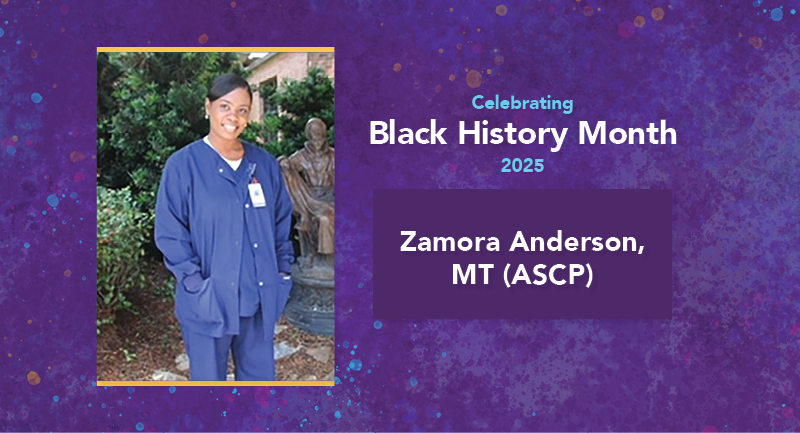As laboratory manager at Our Lady of the Lake Regional Medical Center, Zamora Anderson, MT (ASCP), oversees the day-to-day operations of more than 80 team members who support the lab.
The phlebotomy and central processing labs, responsible for testing patient samples and assisting in patient diagnoses, are both open 24 hours a day, seven days a week. Zamora has served our ministry for more than 20 years.
A Passion for Science and Patient Care
“Clinical laboratory sciences were interesting to me because I have a passion for science and a desire to help others,” Zamora explains. As an introvert, she feels her contribution to patient care is meaningful while allowing her to work in the background, where she is most comfortable.
Zamora encourages Black students who have a love for science and a passion to help others to consider learning more about a career in laboratory sciences.
“Black people do not know about clinical laboratory sciences because we aren’t in the forefront of healthcare,” she says. “We make up a small percentage of laboratory scientists and even smaller percentage of laboratory management positions.”
Family, Faith and a Global Perspective
Zamora credits her family for her successful career. Her father served as Chief Master Sergeant in the U.S. Air Force for more than 30 years, while her mother established her own career while raising a family and frequently moving across the world.
“Living in other countries has given me the opportunity to learn about other cultures and has also taught me how to connect with others,” Zamora says.
Zamora’s parents instilled in their family a strong belief in God. “They taught us to understand the sacrifices of Jesus Christ and how important it is for us to be a vessel in helping all of God’s people,” she says.
Honoring Black History through Awareness and Action
For Zamora, Black History Month is both personal and professional.
“It is a time to renew and remember the many contributions, accomplishments and hurdles Black people have faced,” she says. She encourages other races and cultures to learn the history of Black Americans in an effort for continued positive change.
As a healthcare professional, she recognizes Black History Month as a time to work toward continued improvement in health.
Heart disease, stroke and cancer are the leading causes of death in the Black population, according to the Centers for Disease Control & Prevention.
“Working to create opportunities for Black people to pursue healthy lifestyles as well as early health interventions can lead to longer, healthier lives,” Zamora says.
Reflecting on this year’s Black History Month theme, African Americans and Labor, she remembers her father introducing her to the TV series Roots, a show that highlighted many aspects of African American history.
“I think about the resilience of Black people and thank God. It is important that we honor our ancestors’ struggle and not lose sight or take their efforts for granted,” she says.
Finding Balance through Self-Care and Connection
Zamora has learned how to take time to rest and refresh her mind, body and spirit. She loves to spend time with her family and with herself. “When I take time for myself, I feel sharper and ready to face the day,” she says.
During busy workdays, she takes moments to spend time with her team to learn about their accomplishments and experiences. “A good laugh together or a brief hug helps us get through it together. I appreciate them and could not do my job without them.”
She explains that her colleagues at Our Lady of the Lake instantly felt like family.
“It’s hard to even think that I’ve been here for two decades. It feels just like yesterday when I completed the first day of orientation,” Zamora says.
Our Commitment
Our ministry’s commitment to a culture of belonging supports culturally competent care education for our team members all year long, including during Black History Month each February.




